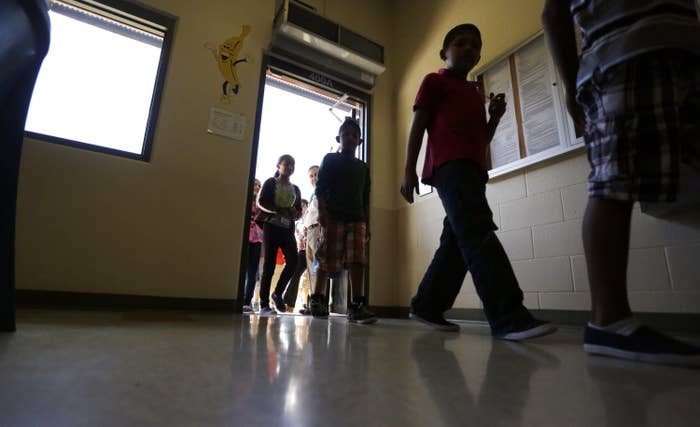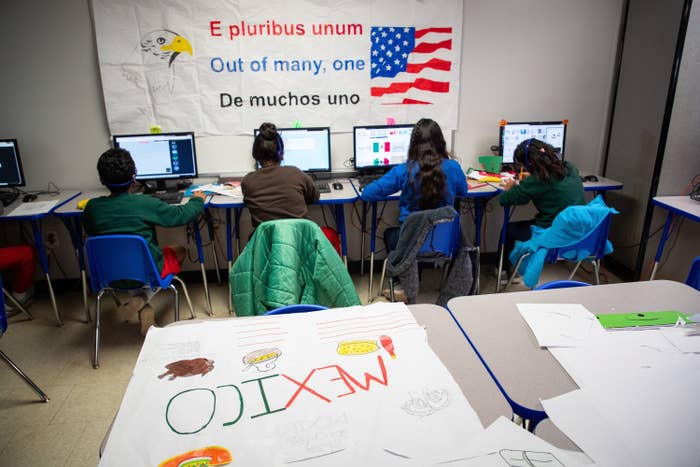
Federal immigration officials on Friday were preparing to deport a group of immigrant children and their parents who advocates said were unlawfully denied the opportunity to seek asylum.
The families, who have been detained by ICE for more than a year, were subjected to Trump administration policies that have since been blocked by federal courts. Attorneys and advocates want these immigrants to go through a new process, without these policies being applied to them
The children and their parents had been shielded from deportation by a temporary stay of removal from the US Court of Appeals for the District of Columbia, but the court vacated it on Monday.
On Friday, six families from Guatemala and six families from El Salvador were taken to separate airports to be deported by ICE, said Shalyn Fluharty, an attorney with Proyecto Dilley, which offers legal services to detained families. Some of the families were pulled from the plane at the last minute while asylum officers reviewed their claims, but at least one family was deported.
"They have been denied a fair process and as a result of this unlawful conduct these families, mothers and children, all face death or unspeakable violence," Fluharty told BuzzFeed News. "These are very brave mothers who have done everything in their power in the face of unbelievable circumstances to fight for the safety of their children."
In a statement, ICE said the immigrant families had taken advantage of all available due process, litigating their claims before the federal courts, including a number of district courts and federal courts of appeals over the course of about a year.
“Despite having received multiple temporary stays of removal, with which ICE complied, those stays were each ultimately dissolved by the federal courts, and there is currently no legal impediment to their removal,” the agency said.
ICE said it removed several immigrants on Friday after reviewing their cases and would continue to processes more deportations when appropriate.The exact number of families who could be deported was unclear on Friday because attorneys aren't sure how many people had been removed earlier in the day.

One of the policies the families were subjected to was the asylum transit ban, which required immigrants to first seek protection in another country through which they traveled before asking for refuge in the US. In July, the 9th Circuit Court of Appeals also blocked the rule, but the ruling didn't help any of the thousands of immigrants, like these families, who had already been subjected to the transit ban.
Under the transit ban policy, those who crossed through a third country, such as Mexico or Guatemala, before arriving at the US southern border were denied asylum during their credible fear interviews, an initial step in the asylum process. After being denied the chance to be screened for asylum, these children and their families were subjected to expedited removal, which allows the government to deport undocumented immigrants without a hearing in front of an immigration judge.
Federal courts have said they don't have the authority to weigh in on expedited removals. As a result, judges can't stop the deportation of these families, even though they've found that the policies leading to their deportations are illegal.
The asylum transit ban wasn't the only policy the families were subjected to that was later vacated or deemed illegal by federal courts.
The families had their credible fear interviews conducted by a CBP officer instead of an asylum officer. An analysis from the Migration Policy Institute, a nonpartisan immigration think tank, from May 2019 to May 2020 found that CBP agents approved just 37% of credible fear interviews, compared to 64% among asylum officers.
The interview was also conducted within 48 hours of arriving at a detention center, the result of a USCIS directive that credible fear interviews be conducted as quickly as possible after 24 hours of arrival to the facility.
A federal judge in Washington, DC, blocked CBP officers from conducting credible fear interviews, calling it illegal because agents do not receive the same level of training as asylum officers working for USCIS. The directive to rush immigrants through the interviews was vacated in March after a federal court concluded that Ken Cuccinelli, who issued the directive, had not been lawfully appointed to his role as acting director at US Citizenship and Immigration Services at the time.
In some cases, asylum officers conducted credible fear interviews using a lesson plan that was also vacated by the DC District Court in October.
Allison Herre, managing attorney at Proyecto Dilley, said the families are scared about the prospect of being sent back to the countries they fled.
"These are refugees who are being sent back to the same situation they fled from," Herre told BuzzFeed News.
In some cases, these immigrant children and their parents are going back to an even worse situation, according to Herre. Some families are waiting to go back to nothing because their homes were destroyed by hurricanes that devastated Central America in November, she said.
A father from Haiti currently detained with his family at ICE's Berks County Residential Center in Leesport, Pennsylvania, said they left their home because of government attacks directed at them for speaking out against human rights abuses.
"We were attacked, beaten and barely escaped," the father said in a statement provided by Aldea — the People’s Justice Center, which offers free legal services to immigrant families detained by ICE in Pennsylvania. "We came to the US thinking, 'This is where we will find refuge,’ only to be thrown in prison for more than eight months.
"We are human beings too," he said. "Our children are human beings too and should not have to suffer like this."
Juan David, an 11-year-old at the South Texas Family Residential Center in Dilley, Texas, said in a statement he has spent more than 15 months in detention.
"They asked me why I am afraid to return to my country. I’m afraid that the gangsters will hurt me, that they will kill me and my mom," Juan David said.
